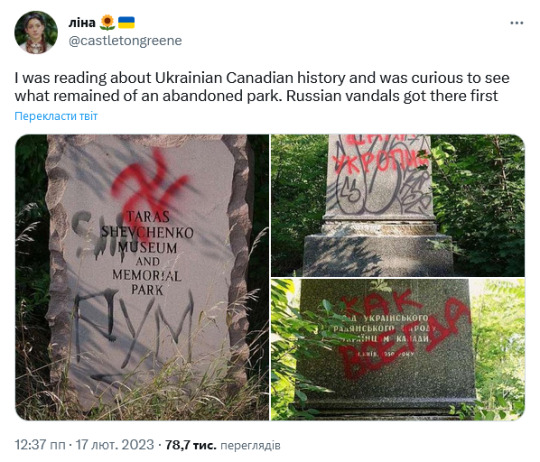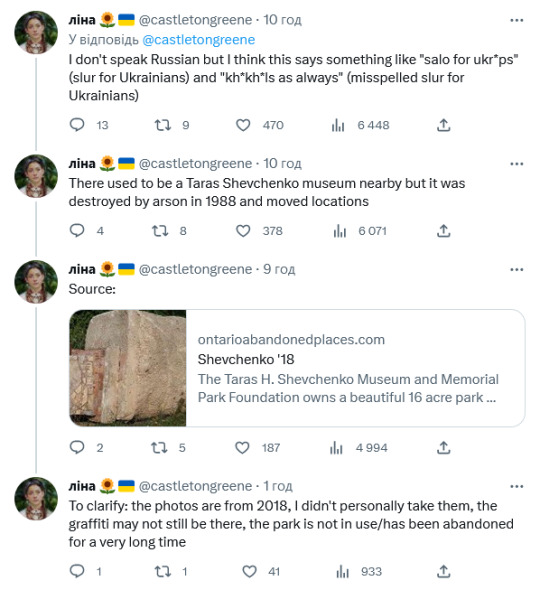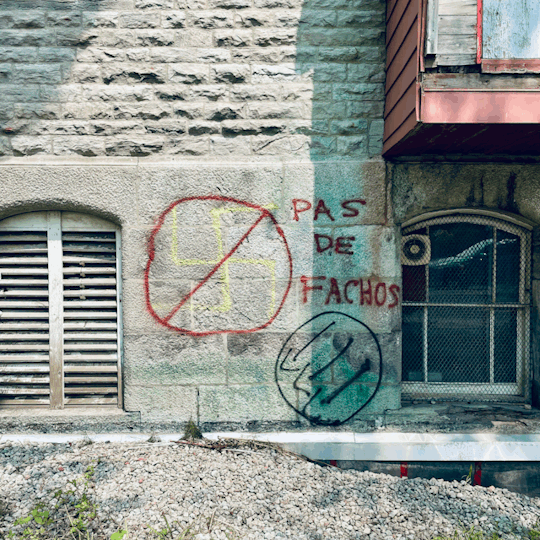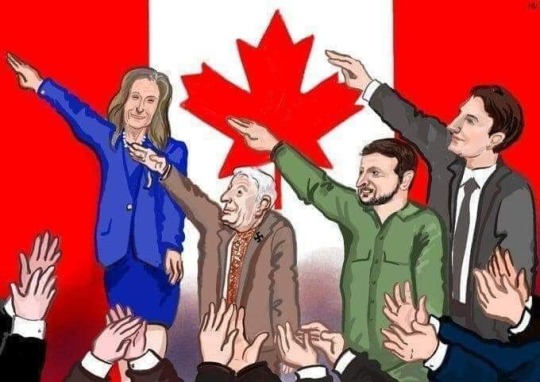#nazis in canada
Text

Politico defending LITERAL WWII Nazis.
Politico seriously suggests there is "nuance" around Yaroslav Hunka's joining of the Nazi 14th Waffen SS Grenadier Division (1st Galicia) to fight the Soviet Union and, like Canadian commentators over the last few days, suggests no war crimes were committed by this Division.
That's COMPLETE AND UTTER LUNACY.
The Nazi Germany 14th Waffen Grenadier Division of the SS was NOTORIOUS for SLAUGHTERING their way through Ukraine, enthusiastically participating in the genocide of Poles, Roma, Jews, and Socialists/Communists
These people are manipulating history and your ignorance of it to make Nazis go from black and white obvious evil, to shades of grey in which you're not "expert" enough to have an opinion on, thereby weakening efforts to expose fascist ideology being integrated into Western society.
#nazis#yuroslav hunka#nazis in canada#nazis in ukraine#western propaganda#us propaganda#war propaganda#propaganda#news#politico#politics#world news#international news#geopolitics#geopolitical news#geopolitics news#geopolitical events#international affairs#international politics#socialism#communism#marxism leninism#socialist politics#socialist news#socialist#marxism#communist#workersolidarity#worker solidarity#WorkerSolidarityNews
208 notes
·
View notes
Text
This may be worse than what the US did.
255 notes
·
View notes
Text
The speaker of Canada’s House of Commons resigned Tuesday for inviting a man who fought for a Nazi military unit during World War II to Parliament to attend a speech by the Ukrainian president.
Just after Ukrainian President Volodymyr Zelenskyy delivered an address in the House of Commons on Friday, Canadian lawmakers gave 98-year-old Yaroslav Hunka a standing ovation when Speaker Anthony Rota drew attention to him. Rota introduced Hunka as a war hero who fought for the First Ukrainian Division.
Observers over the weekend began to publicize the fact that the First Ukrainian Division also was known as the Waffen-SS Galicia Division, or the SS 14th Waffen Division, a voluntary unit that was under the command of the Nazis.
Full article
Tagging: @allthecanadianpolitics
#cdnpoli#canada#canadian news#canadian politics#anthony rota#house of commons#parliament#nazism#nazis#antisemitism#nazi mention#justin trudeau#volodymyr zelenskyy#nazism tw#nazis tw#antisemitism tw#nazi mention tw#world war two#mine#ukraine
243 notes
·
View notes
Text
Maryland’s top utility regulator was watching the news one February morning when a headline blindsided him: Two suspects with neo-Nazi ties had been charged with plotting to take down Baltimore’s power grid.
Jason Stanek, the then-chair of the state’s Public Service Commission, said Maryland regulators were “caught flat-footed,” not hearing a word from law enforcement before the news broke — or in the months afterward. Federal prosecutors have alleged the defendants were driven by “racially motivated hatred” to try to cut power to hundreds of thousands of people in the state’s largest city, which has a predominantly Black population.
The FBI declined to comment on its communications with the Maryland commission. But Stanek’s experience is not uncommon.
A POLITICO analysis of federal data and interviews with a dozen security, extremism and electricity experts revealed that despite a record surge in attacks on the grid nationwide, communication gaps between law enforcement and state and federal regulators have left many officials largely in the dark about the extent of the threat. They have also hampered efforts to safeguard the power network.
Adding to the difficulties, no single agency keeps a complete record of all such incidents. But the attacks they know about have regulators and other power experts alarmed:
— Utilities reported 60 incidents they characterized as physical threats or attacks on major grid infrastructure, in addition to two cyberattacks, during the first three months of 2023 alone, according to mandatory disclosures they filed with the Department of Energy. That’s more than double the number from the same period last year. DOE has not yet released data past March.
— Nine of this year’s attacks led to power disruptions, the DOE records indicate.
— The U.S. is on pace to meet or exceed last year’s record of 164 major cyber and physical attacks.
— And additional analyses imply that the true number of incidents for both 2022 and 2023 is probably even higher. POLITICO’s analysis found several incidents that utilities had reported to homeland security officials but did not show up in DOE data.

According to a report on grid security compiled by a power industry cyber clearinghouse, obtained by POLITICO, a total of 1,665 security incidents involving the U.S. and Canadian power grids occurred last year. That count included 60 incidents that led to outages, 71% more than in 2021.
While that report does not break down how many of those incidents occurred in which country, the U.S. has a significantly larger grid, serving 145 million homes and businesses, with nearly seven times Canada’s power-generating capacity.
Law enforcement officials have blamed much of the rise in grid assaults on white nationalist and far-right extremists, who they say are using online forums to spread tactical advice on how to shut down the power supply.
Concerns about the attacks have continued in recent months, with incidents including a June indictment of an Idaho man accused of shooting two hydroelectric stations in the state.
But law enforcement officers investigating alleged plots against the grid don’t necessarily alert the Energy Department or other regulatory bodies.
“We have no idea” how many attacks on the grid are occurring, said Jon Wellinghoff, a former chair of the Federal Energy Regulatory Commission, which regulates the U.S. electric grid. “It looks like they’re escalating if you look at the data. But if you don’t have enough data, you can’t discern patterns and proactively work to stop these things from happening.”
Wellinghoff was FERC’s chair when an unknown sniper attacked a Pacific Gas and Electric substation in San Jose, Calif., in 2013 — an incident regulators have described as a “wake-up call” on the electricity supply’s vulnerability to sabotage.

Last year’s record number of physical and cyber disruptions to the U.S. power system included several incidents that captured public attention, such as a December shooting attack against two North Carolina substations that left 45,000 people without power for four days. The state’s medical examiner has blamed the attack for the death of an 87-year-old woman who died after her oxygen machine failed, ruling it a homicide. Nobody has been charged.
“There is no doubt there’s been an uptick over the last three years in the amount of incidents and also the severity of the incidents,” said Manny Cancel, senior vice president at the North American Electric Reliability Corp., the nonprofit body in charge of setting reliability standards for the bulk power system. He is also CEO of its Electricity Information Sharing and Analysis Center, which gathers and analyzes data from power companies.
Cancel said NERC has “seen two pretty substantial increases” in incidents coinciding with the 2020 and 2022 election cycles.
Grid attacks that led to power outages increased 71% from 2021 to 2022, totaling 55 incidents in 2022, according to a NERC briefing to utilities that POLITICO obtained. That increase was primarily due to a rise in gunfire assaults against critical infrastructure.
The largest outage reported from a physical attack early this year — which occurred in March in Clark County, Nev. — affected more than 11,000 people, according to DOE data.
But the state Public Utilities Commission was not aware of any outage due to an attack occurring that day, spokesperson Peter Kostes told POLITICO by email. That’s even though state regulations require utilities to contact the commission within four hours of a significant outage.
The state’s largest utility, NV Energy, said in a statement that it had reported the incident to local law enforcement “as soon as we learned about this incident ... so we can continue to increase our resilience against ongoing threats to the energy industry.” A spokesperson for the utility did not respond to multiple requests for comment on whether it had informed the commission.
Federal regulations also require utilities to report cyber or physical attacks to DOE, including physical attacks that cause “major interruptions or impacts” to operations.
They must also tell the department about disruptions from weather or other causes that meet certain criteria, such as those that cut off service to more than 50,000 customers for at least an hour, an uncontrolled loss of more than 200 megawatts of power, or a utility voluntarily shutting more than 100 megawatts, according to an Energy Department spokesperson. The spokesperson provided the information on the condition that they not be identified by name.
The Energy Department’s records don’t include at least seven reported physical assaults last year and this year that the Department of Homeland Security and the affected utilities said caused substantive economic damage or cut off power to thousands of customers. POLITICO found these incidents by cross-checking the department’s data against warnings issued by DHS and the FBI’s Office of the Private Sector.
DOE said the incidents may not meet its reporting thresholds.
Several of the incidents missing from DOE’s data involved clear physical attacks, based on other agencies’ descriptions. But the utilities involved said they did not report the incidents to the department because the attacks did not affect the kind of major equipment that could lead to widespread, regional power failures.
One of the incidents not found in DOE’s records cut off power to about 12,000 people for roughly two hours in Maysville, N.C., after a shooting damaged a substation in November, according to a DHS report. The FBI’s investigation into the incident is ongoing, according to the intelligence agency.
The utility affected by the incident, Carteret-Craven Electric Cooperative, reported the incident to NERC’s Electricity Information Sharing and Analysis Center, but didn’t report the attack to DOE because it was a “distribution-level” incident, said Melissa Glenn, a spokesperson for the utility. That means the outages caused by the damage would have been limited to local power customers and not lead to the wider blackouts federal regulators are most concerned with.
In another case unreported to the Energy Department, a substation owned by the East River Electric Cooperative serving the Keystone oil pipeline in South Dakota was attacked by gunfire late at night in July 2022, according to DHS. The incident caused more than $1 million in damage and forced the pipeline to reduce operations while repairs were underway.
East River co-op spokesperson Chris Studer said the utility reported the incident to local law enforcement, which brought in the FBI. East River also reported the incident to NERC and its E-ISAC, along with regional grid agencies, but said it did not report it to DOE because the attack did not affect the bulk power system.
Brian Harrell, a former assistant secretary for infrastructure protection at DHS, said in an email that utilities have too many competing agencies to report to, and suggested reporting be streamlined to NERC’s E-ISAC.
“This lack of consistency, by no fault of the utility, suggests that the numbers may not paint a complete picture,” he said.
Grid experts said these data gaps clearly indicate a lack of understanding about which agencies utilities need to report to and when.
Utilities may be using a “loophole” based on definitions of what constitutes “critical infrastructure,” said Jonathon Monken, a grid security expert with the consulting firm Converge Strategies. He was previously senior director of system resilience and strategic coordination for the PJM Interconnection, the nation’s largest power market.
There are “lots of ways” to work around DOE requirements, Monken added, but as he reads the regulation, utilities are required to report any operational disruptions caused by a physical attack.
“[I]t appears the information you collected shows that companies are still missing the boat when it comes to mandatory reporting,” he said. “Not good.”
One former FERC official who was granted anonymity to speak about a sensitive security issue said the commission also received no alerts from law enforcement officials about the planned and actual attacks that took place last year. That omission hinders agencies’ ability to respond to these kinds of events, the person said.
A spokesperson for FERC declined to comment on the commission’s communications with law enforcement.
But Cancel defended government agencies’ response to these incidents, and said federal investigators may have had specific intelligence reasons for keeping FERC and state utility agencies out of the loop.
“I’m not a lawyer or a law enforcement professional, but you had an active criminal investigation going on,” he said. “I don’t think they wanted to sort of blow the horn on that and compromise the integrity of the investigation.”
An FBI spokesperson offered no direct response to these criticisms in an email, but said the agency “views cybersecurity as a team sport.” The person commented on the condition that the remark be attributed to the bureau.
The FBI urged utility executives last month to attend security training hosted by intelligence agents in order to ensure they are up to speed on the threats posed by bad actors.
“We can’t do it without you,” Matthew Fodor, deputy assistant director of the FBI’s counterterrorism division, said during an all-day FERC technical conference on Aug. 10. “The challenges that we have — and DOE can probably speak to this better than anybody — is limited resources.”
People attacking the electricity supply have thousands of potential targets, including power substations and smaller but critical pieces of utility infrastructure. The smaller pieces often go unprotected because federal standards do not require utilities to secure them.
Nearly half of the 4,493 attacks from 2020 to 2022 targeted substations, according to the NERC briefing from February, making them the most frequent targets for perpetrators over that period.
Details on how to carry out these kinds of attacks are available from extremist messaging boards and other online content, researchers and federal security officials say. These include maps of critical entry points to the grid, along with advice that extremists have gleaned from incidents like the assault in North Carolina.
Stanek, the Maryland electricity regulator, said he was “disappointed with the level of coordination and communication” that federal and state law enforcement displayed in handling the alleged plot in Baltimore. No trial date has been announced for the case, which is in U.S. District Court in Maryland.
Maryland’s Public Service Commission is in charge of ensuring that the state’s power system keeps the lights on. Regulators need to be kept informed of threats to the system so they can coordinate with other agencies in case an attack succeeds, Stanek said.
At the same time, he quipped, maybe he was better off in the dark after all.
“There’s a lot of colorful details in [the FBI report],” Stanek said. He paused, thinking. “And honestly, as a regulator, had I received these details in advance and shared the information with trusted sources within state government, I would have had sleepless nights.”
“So perhaps the feds did a favor by only sharing this information after everything was all said and done,” he added.
#us politics#news#politico#2023#alt right#domestic terrorists#neo nazis#fbi#power grids#power outages#Department of Energy#canada#white nationalists#Federal Energy Regulatory Commission#US electric grid#North American Electric Reliability Corp.#Department of Homeland Security#Office of the Private Sector#counterterrorism#cybersecurity#utility infrastructure#maryland
75 notes
·
View notes
Text
Canada had a Nazi collaborator invited to sit in on, and honoured in, our House of Commons by the Speaker of the House.
If you don't know how Canada's government works, our House of Commons is where all 338 Members of Parliament (MP's) gather to discuss proposed bills, argue specifics, and vote on passing those bills. It's where our political, economical, and social decisions get made into law. It's kind of the last place you want a Nazi collaborating piece of shit being invited into.
Reasonably, people are pissed, none more than the Jewish community. Yom Kippur is a high holiday of remembrance for the Jewish, and just days after it, having this happen is just ... I want to say un-fucking-forgiveable but that's not a statement that cuts deep enough. I'm not just upset, I'm beyond enraged. Giving these people, Nazi's, any fucking recognition, even on accident, is appalling.
It's for damn good reason that there is now a call for the Deschênes Commission's Report conducted around the 1980's to be declassified and made public. This report was the results on an inquiry on the War Criminals and Nazi collaborators allowed into Canada post WWII. The people, especially our Jewish residents, deserve to know what activities these people were up to.
I'm fully on board with this myself. Why? Well if you can't tell, it's a bit fucking personal. No, a lot fucking personal. Nazi's have shown up to anti-transgender rallies, we've seen Nazi's show up to the truckers rally that happened during COVID. They've openly waved their flag in public. Jewish people, if you happen to pay any attention at all to their online presence and communities, have expressed an increasing fear of how unsafe public life is becoming for them. There is a very real fear of a repeat of events, which is why we fucking cannot give anyone with previous history with the Nazi party the time of day.
The moment a tiny piece of legitimacy is given, and it was given this time with a standing applause, these Nazi bastards will push for more. They will try for more. It's how these bastards work. They'll appropriate anything to give themselves shreds of legitimacy. Canada needs to make a clear fucking point that we do not support them in any way.
Part II of the Deschêntes Commission's report needs to be made public. People deserve to know. The Jewish community deserves to know.
And if it isn't apparent: fuck Nazi's and everything they stand for. Fuck fascists too. Stay the fuck off my blog if you're either. You're not welcome here.
Jewish side of tumblr: if I fuck something up about you or your history, please correct me. Your faith is one of the few I respect in this world.
#canada news#canada politics#canada#trans#transgender#jewish#jew#nazi#talisidekick#talisidekick things
98 notes
·
View notes
Text
B’nai Brith is pleased that our advocacy has finally led Canada to declassify a report detailing the extent to which Nazi war criminals settled in this country after World War II.
This uncomfortable chapter in Canadian history resurfaced in September, 2023, after Parliament celebrated a 98-year-old former member of the Nazi Waffen SS. Following this outrage, B’nai Brith reiterated its longstanding call for the Government to release all Holocaust-related records.
Earlier Wednesday, the Honourable Marc Miller, Minister of Immigration, Refugees and Citizenship, announced the release of a more complete version of the Rodal Report, a document originally prepared by historian Alti Rodal as part of the 1985-1986 Commission of Inquiry on War Criminals in Canada (the Deschênes Commission) – Canada’s only official inquiry into Canada’s Nazi past.
Rodal’s work, largely based on materials that are still classified, was the first to hint at the extent to which Canada provided a safe haven to former Nazis during the Cold War.
B’nai Brith Canada has been advocating for the release of the entirety of the report of the Deschênes Commission’s findings since the 1980s, when our senior legal counsel, David Matas, represented the organization before the Commission. Ever since, Matas and B’nai Brith have been lobbying for the public release of the totality of the inquiry’s report.
“We welcome this almost complete disclosure of the Rodal Report,” Matas said Wednesday. “It is now close to 79 years since World War II and more than 37 years since the completion of the Rodal Report. Yet, in light of ongoing mass atrocities in many locations on this planet, and the efforts of many perpetrators to seek a haven in Canada, this Report has contemporary relevance.
“We cannot learn from the past unless we know the past. The almost complete disclosure of the Rodal Report is an important step in coming to grips with our past and applying its lessons for the present.
“We look forward to continuing and ultimately completing disclosure of the Rodal Report, the Deschênes Report Part II and the Government of Canada Nazi war crimes files.”
Within the past year, B’nai Brith Canada filed several Access to Information and Privacy (ATIP) requests, which the Government repeatedly declined. Lawyers David Rosenfeld, Michael Wenig and Rachel Silber – members of B’nai Brith’s Matas Law Society (MLS) – have provided valuable assistance to our campaign to correct this historic wrong.
Following the Parliament debacle this past fall, several academics, scholars, and leading community organizations signed letters of support for, or endorsed, our ongoing national campaign to unseal Canada’s secret Nazi records. The newly released portions of Rodal’s study will help to complete the picture, but there is still much to be done to come to grips with our nation’s Nazi past.
“This is an important first step towards full public accountability,” said David Granovsky, B’nai Brith Canada’s Director of Government Relations. “We thank Minister Miller and look forward to continuing to work with the Government to declassify all Holocaust-related archival materials.”
21 notes
·
View notes
Text
A Canadian woman tell a Palestinian woman she should be raped and killed in front of her children!!! Was she tracked and suspended from her job? Was she stigmatized as a terrorist and a sexist person?? Did wherever she works release a statement declaring she would be investigated for the crimes of terrorism and sexism? Nope. Only when you defend Palestinians.

author Lauren wise
#canada#anti zionisim#palestine#free palestine#Middle East#Zionists#nazi#gaza#israel#author Lauren wise
20 notes
·
View notes
Text

33 notes
·
View notes
Photo


#ukraine#russia#war in ukraine#canada#xenophobia#fascism#nazism#rushism#this is a taras shevchenko monument#he was a romantic/anti-imperialist poet#not some nazi russians accuse us of being
66 notes
·
View notes
Text
Prime Minister Justin Trudeau said Wednesday senior bureaucrats are reviewing the Deschenes Commission report — a 1980s-era independent inquiry that looked at alleged Nazi war criminals in Canada — with an eye to making more of it public.
Governor General Mary Simon also said today Rideau Hall is sorry for honouring Peter Savaryn — a former chancellor of the University of Alberta who served in the same Nazi unit as Yaroslav Hunka — with the Order of Canada.
"We express our sincere apology to Canadians for any distress or pain his appointment may have caused," a spokesperson for Simon said.
Full article
Tagging: @politicsofcanada
#cdnpoli#canada#canadian politics#canadian news#canadian#nazis#nazi mention#justin trudeau#nazis tw#deschenes commission
89 notes
·
View notes
Text
Justin Trudeau on his government honouring a Nazi: "I'm very sorry. Not sorry that we did it, I'm sorry that everyone found out."
Asked if he thought it would hurt his chances at re-election, Trudeau said "I got away with doing blackface multiple times, I think I can get away with this too."
#mine#cdnpoli#samira does satire#sarcasm#satire#canadian news#canada#justin trudeau#nazi mention#nazis tw#racism#antisemitism
75 notes
·
View notes
Video
DISCLAIMER: Please do your own research and come to your own conclusions.
Nazi Roots Of Canadian Deputy Prime Minister Chrystia Freeland.
47 notes
·
View notes
Text
On today's disability day of mourning, I would like to remind people that the first victims of the nazi regime were disabled people. Disabled people were considered to have "life unworthy of life" and to be "useless eaters." This rhetoric was not left in the '40s; people continue to believe similar things about disabled people and our value, and there are still disabled people murdered around the world by their families or caregivers. Today is a day of mourning, but I would also like to reaffirm that this rhetoric is wrong; we all have value as human beings, regardless of our differences, regardless of our needs, and regardless of our economic output.
#Being in Vienna on today's disability day of mourning means that the victims of the holocaust#have been top of mind#I'm a subway ride away from the hospital that killed nearly 800 disabled children#And I know that my grandmother born pre-mature in 1940#would have been considered life unworthy of life#Vienna has improved undoubtably#but I can't help but feel the acute difference in how many fellow disabled people I see in public#Compared to Canada or even other countries I have visited#The loss of those children#and all disabled people murdered by the nazi regime#still has echos in todays world#My grandmother is still alive some of those children would still be alive today had it not been for the rhetoric that they were unworthy#They never got a chance to become adults but they should have
6 notes
·
View notes
Text

PAS DE FACHOS
#graffiti#Hochelaga Maisonneuve#Hochelaga#Montréal#Québec#Canada#français#fachisme#nazisme#nazi#croix gammée#Hakenkreuz#svastika#église#antifa
19 notes
·
View notes
Text
I see people being surprised that the Canadien parliament was celebrating and clapping for an actual Nazis. As in a WW2 Nazis.
This is not surprising at all. Know one thing. The only reason we learn that Nazis are bad is because they threatened the West. It was never about protecting Jews, Romani people or gay men. It was about protecting the West and white people from Germany. Western governments who fought against the Nazis and claim today that they did to save Jewish people are the same western government who considered Black, North African, Brown and sometimes Jewish people to be legally 3rd class citizens. They are the same western government who created concentration camps in Algeria AFTER ww2 ended. The same government who used to cut the hands of Black people in Congo if they didn’t work fast enough. The same government who were removing African men (Black and North African) from their land to send them to fight against the Nazis (with lower pays and less rights then white soldiers) and then on Victory Day they replaced them by white soldiers for the celebrations. It was never about human rights or helping marginalized communities it was about protecting whiteness.
That’s why it’s not surprising that Nazis are reestablished or celebrated. Because they are not seen as a threat to the West anymore they are only a threat for marginalized communities so there’s no reason for white people to fight them.
It doesn’t mean we need to think the fight is lost and we need to give up. We actually need to fight more for ourselves and for the future generations. But honestly we also need to stop being surprised when they show their true faces.
For white allies: Stop seeing yourself as saviors or to consider that you are “helping” this is YOUR future too. You’re helping yourself when you fight alongside us just like we are helping ourselves and that’s perfectly okay. We’re either winning all together or losing all together. But you really need to stop being surprised or choked when stuff like that happens. Learn your own history. There is nothing surprising about it. It’s disgusting but not choking or surprising.
16 notes
·
View notes
Text

5 notes
·
View notes